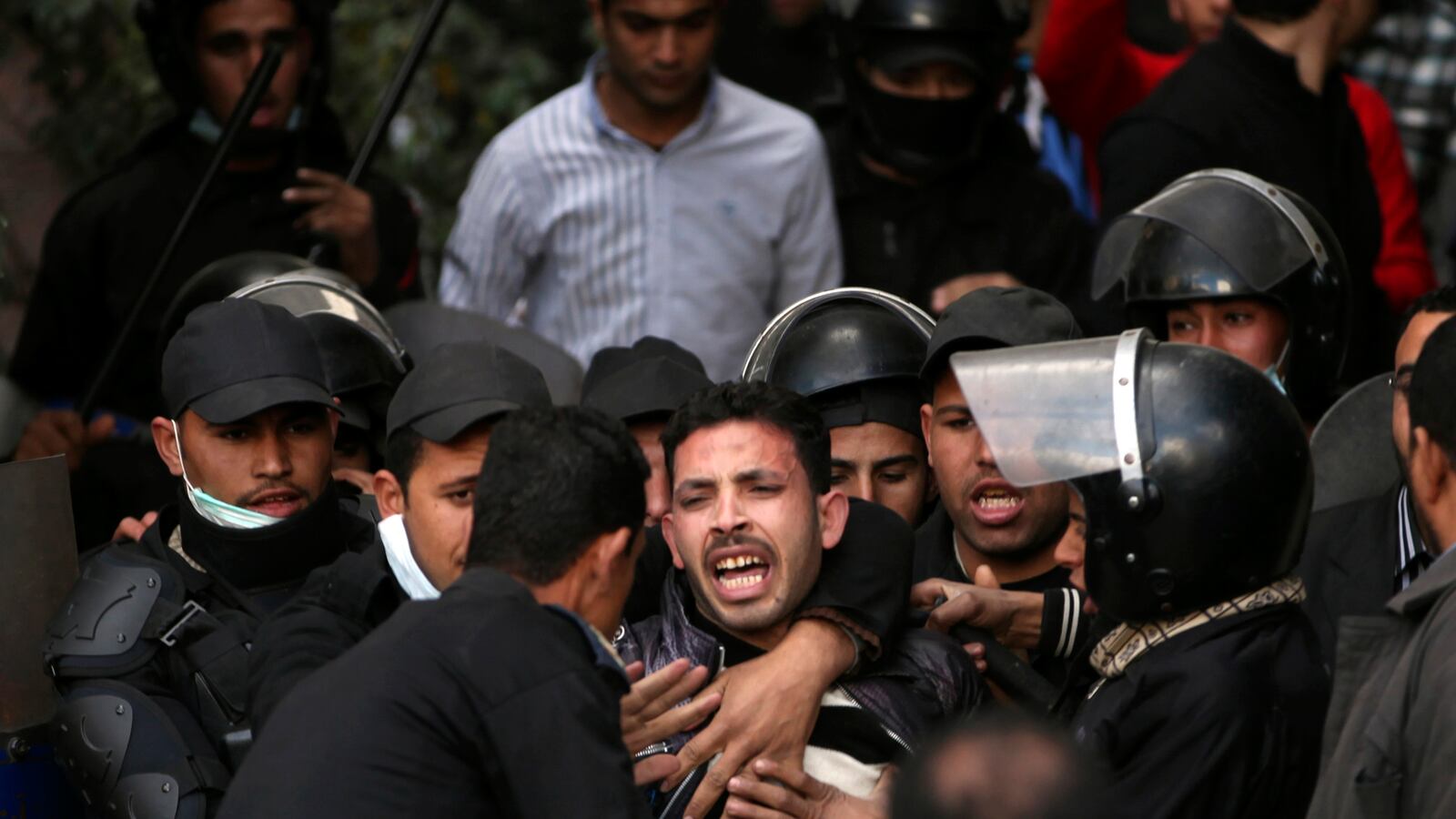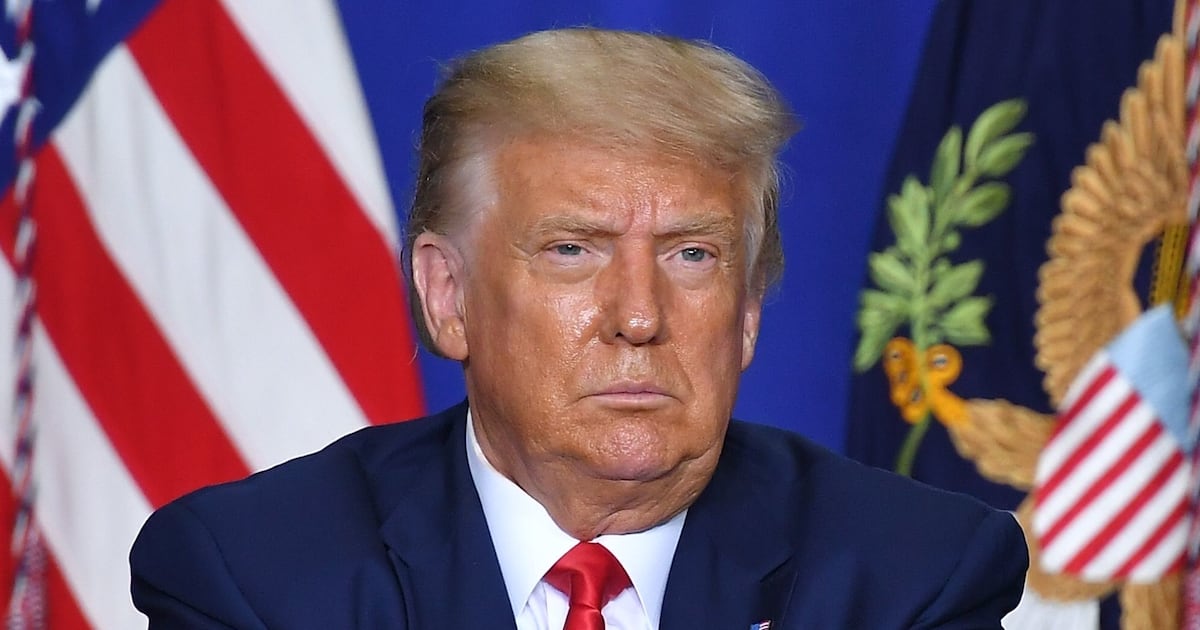On Tuesday, as protesters and police continued to clash across Egypt, Gen. Abdul Fattah al-Sisi—the defense minister and Army chief—unexpectedly entered the fray.

Three major cities in the Suez Canal area were roiling with unrest, sparked by a court verdict that sentenced soccer fans to death for their roles in a riot last year. But with each passing day, the demonstrations seemed to be less about the verdict and more about Mohamed Morsi, Egypt’s embattled president. When Morsi issued an emergency decree to calm the situation, protesters ignored his curfew, pouring into the streets to chant slogans and play soccer as Army troops stood idly by. By Tuesday, with smaller clashes under way in other cities, including Cairo, Sisi fired what many saw as a warning shot to Morsi and his Muslim Brotherhood–backed government: if Egypt can’t get its political house in order, Sisi said in a statement on the military’s Facebook page, the state is at risk of “collapse.”
Sisi’s comment set off a firestorm of speculation about whether the Army will intervene in the current crisis—and revived questions about the nature of its shadowy relationship to the president and his ruling party.
The Egyptian military can be insular and difficult to read. While it had a close alliance with former dictator Hosni Mubarak—himself a military man—it refused to fire on protesters during the revolution two years ago, helping to pave the way for Mubarak’s ouster. After its fitful stint running the country before Morsi’s June election, the Army does not seem eager to return to politics. In his statement, Sisi gave no indication that the Army was considering a coup, and he cast blame generally at Egypt’s “political forces.” But he also didn’t offer Morsi any support. “I see this as a warning from the military,” says Paul Sullivan, an Egypt expert at the National Defense University in Washington, D.C. “If it looks like the state is collapsing, the military may have to make a move.”
Morsi’s opponents are also on alert for signs that the Army may be getting ready to intercede. “There is a sense that it may happen,” says one veteran revolutionary activist. “It’s not that we would welcome it. It’s more, how would we deal with this, and what is our stance?”
Morsi himself installed Sisi, then a relatively low-profile figure, as military chief this summer, forcing a cadre of leading generals into retirement in a move seen as an attempt to bring the military to his side—or at least to keep it from meddling in his government’s affairs.
Before the revolution, the Army and the Brotherhood had a long history of enmity. Some analysts believe that the military remains suspicious of the Brotherhood—and read Sisi’s statement as a sign that the top generals think Morsi and his allies have brought Egypt to the brink. “Al-Sisi is a careful fellow,” Sullivan says of Sisi’s warning. “He would not say this unless he felt there was a good possibility it could happen.”

The idea of the military returning to politics sits uneasily with many of the country’s liberal activists—they campaigned vigorously against the generals who ruled after Mubarak’s fall. “Right now the last thing we need is the military coming back to power,” says Mohamed Ghorab, who advocates against the practice of trying civilians in military courts. “They would work more aggressively against anyone who opposes them. Civilians would have no rights.”
At the same time, however, some in the opposition—which is locked in a bitter battle with Morsi and the Brotherhood—have raised the specter of a coup as evidence of Morsi’s failings and perhaps also as a means of pressuring him to compromise. Mohamed ElBaradei, the Nobel laureate who leads Egypt’s main opposition bloc, has repeatedly suggested that the Army might be preparing to take over from Morsi. “I am not legitimizing it. I do not want to see it,” ElBaradei said in a recent interview with The Daily Beast. “I’m reading what I see.”
On Wednesday, ElBaradei called for a national dialogue and urged Morsi to form a new “national salvation government” that would include members of the opposition. Surprisingly, he was joined in his call by the Salafist al-Nour party, which is normally allied with Morsi—providing yet another jolt to the president. At a news conference the same day in Berlin, where Morsi was meeting with German Chancellor Angela Merkel, he stated that Egypt already has a “stable government.” But he cut his Europe trip short to return home.
ElBaradei and other opposition leaders held a rare meeting with senior Muslim Brotherhood members Thursday, emerging with a pledge to renounce violence and engage in further talks.
Firas Abi Ali, an Egypt expert at IHS Exclusive Analysis, a risk-consultancy firm in London, points out that the military benefits greatly from the controversial Constitution that Morsi and his allies pushed through last year, making the generals unlikely to step in. The new document contains clauses that “guarantee protection for the Army’s political and economic interests,” Abi Ali says. “The Army is therefore unlikely to side with the protesters, but nor is it likely to jeopardize public support for the Army or risk its own disciplinary cohesion by becoming committed to direct confrontation with protesters.”
Some besieged Egyptians have come to believe that a return to military rule might be the only remedy for the country’s chaos. In central Cairo on Wednesday, employees stood outside the destroyed entrance to the upscale InterContinental Semiramis Hotel. Lights were smashed; shards of window glass littered the ground. A day earlier, as police and demonstrators clashed nearby, masked gunmen had stormed the building en masse and looted the place, ransacking everything from the shops in the lobby to the computers at the front desk. “They came in huge numbers. We couldn’t even count them,” one man said. “They took everything.”
Outside the hotel, riot police in helmets and body armor had massed behind a concrete barricade. From the other side, demonstrators lobbed rocks. The police threw the rocks back and fired tear gas in smoky arcs over the wall. Occasionally they captured a demonstrator and dragged him back into their ranks. One man screamed as a riot cop punched him squarely in the face.
One of the hotel’s workers, who held a metal rod, said the country’s problems ran deeper than the current administration. “The problem is not Morsi’s ways,” he said. “The problem is that chaos now rules the country.”
He added that the Army would soon take over again, which he said was “definitely” a good thing—it was the only authority that people respected enough to obey. “Of course, [Morsi’s] legitimacy would fall apart,” he said, before running off to help police who had begun scuffling with a newly captured demonstrator.
At the edge of the crowd, a young riot cop shuffled about anxiously—he said he desperately needed to pee—and mused on the seemingly endless nature of the unrest. “These kids are on drugs,” he said. “If I throw two stones, my arm hurts. They’ve been at it for ages.”
On the other side of the wall, 22-year-old Moustafa Mohamed sat on a motorcycle he was using to shuttle injured protesters away from the front lines. While he thought a coup was unlikely, he said that he was hoping for one. Morsi was as bad as Mubarak, he said, and another revolution was needed. But, he added, “We don’t know who would run the country after Morsi.”Around Mohamed, protesters all had a similar response to the question of whose side the Army was on. “Mine,” one said. “Ours,” said another. “The people,” said a third, thumping his fist on his chest.
As tear gas filled the street, a group of teenagers scurried back and forth from the front lines, ferrying tissues and baking powder to help combat the effects of the chemicals. One of the teens, a 16-year-old named Mohamed Said Hussein, pointed out that Morsi had been in power for just six months and shouldn’t be blamed for all of Egypt’s problems. And while he didn’t like Morsi, he liked the idea of a military coup even less. Morsi’s opponents, he said, should wait until the next elections and vote him out. “If they would just leave Morsi in power for four years, then after that, it would be, sorry, Mr. Morsi, we don’t want you anymore. The people don’t want you,” he said. “If they push him out now, he and the Brotherhood will just keep coming back.”






